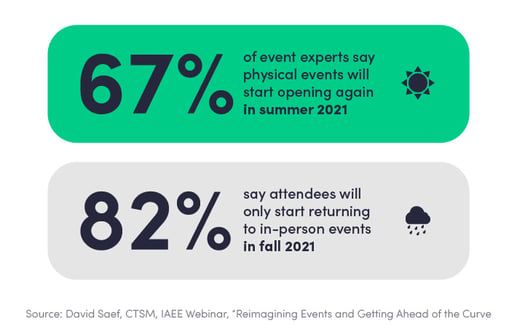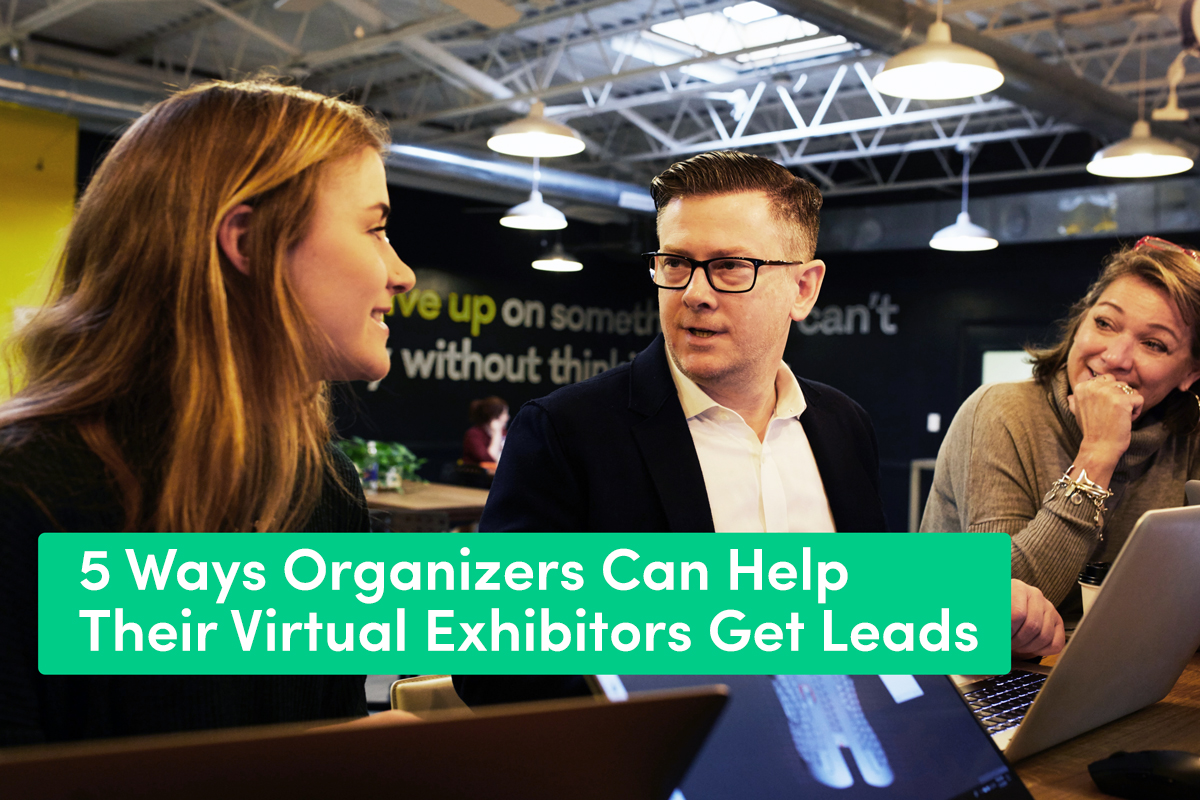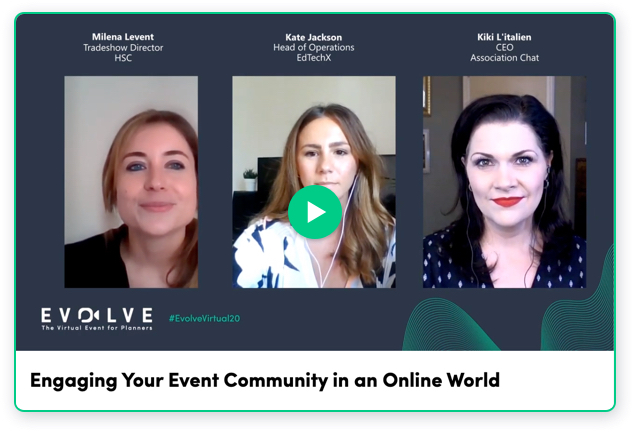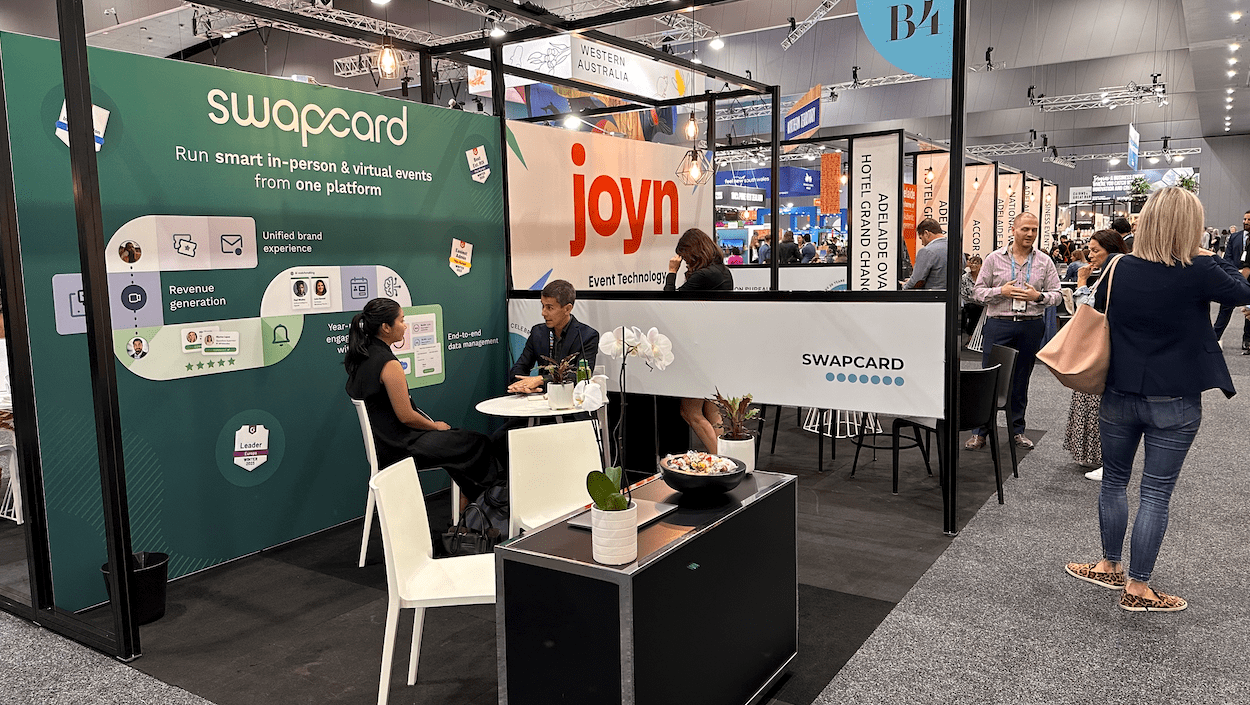Before the COVID-19 pandemic, the events industry was doing fine: chugging along but not thriving. When the health crisis went global and the subsequent ban on gatherings wreaked havoc on the industry, we were forced to make some changes.
We don't know for how long the pandemic will hang around. In the meantime, there's only one option if you don't want to get left behind: going virtual. Now is the time to train your teams, learn new skills, and prepare for an unknown future. According to David Saef, CTSM, who spoke at the recent IAEE Webinar, “Reimagining Events and Getting Ahead of the Curve”, 67% of event experts say physical events will start opening again in summer 2021, but a staggering 82% say attendees will only start returning to in-person events in fall 2021. We can tackle it together as an industry by learning from each other if we collaborate and share our success!

One of your biggest challenges is probably attracting sponsors for your virtual events. Well, there's one thing you need to know: virtual events are far more profitable for sponsors than physical ones ever were. Here's why monetizing them is easy.
Different event models. Different sponsorship models.
Between an in-person, a virtual, and a hybrid event, some aspects differ. There are also many commonalities. Overhead costs are higher for in-person events and lower for virtual or hybrid events. The price of a large venue, catering and insurance for a 3-day event accommodating 5,000 people isn't the same as the price of an online platform and the odd small venue hire for smaller, regional streaming events.
The number of attendees also differs greatly. A physical event can only accommodate so many people while online versions have limitless capacity.
For sponsors, lead generation methods differ for each event type. For that reason, they perceive the value of each type of event differently. When sponsors hear about the potential of lead generation and added value in virtual and hybrid events, of an online platform open all year long, they'll be ready to pay much more to partner with events that have an online component.

Yesterday's model: In-person events
The industry has been perfecting this method for years: selling booth space by the square meter, thinking bigger is necessarily better. But what people didn't realize or (didn't want to realize) before COVID-19 came along was that there were many challenges to this model. Sticking with it would put the events industry at a disadvantage. Some of these challenges included:
- There was never enough time to meet everyone at physical events. 3 days and thousands of people mean sponsors lose out on important leads and attendees didn't get the full networking experience.
- After an in-person event, people said "Goodbye!" and waited a whole year before seeing each other again. But today's exhibitors are pushing for the old business model to change. They're looking for something new is; a key link to keep leads interested and active all year long - namely, a year-round online platform, which will be explained a little later in this article.
- Simply put, event organizers were not sufficiently data-driven. This made it difficult to measure the ROI of an ad, a sponsored session, or a booth and near impossible to prove value to sponsors.
- It was always difficult to reach an audience at physical events. Sure, they could be captivated with lighting and interesting speakers, but the engagement side of things was lacking. During a physical conference, attendees can be shy to ask a question in front of an entire audience and it can be challenging to obtain feedback on-site.

- It was also impossible to create individual journeys for each attendee, which are a great tool for making them feel acknowledged and keep them coming back every year. Event content and ads were not targeted to specific groups, because everyone was walking past them in the lobby or seeing them on stage, so they had to be one-size-fits-all. We now know that personalization and tailoring of an attendee's event experience with artificial intelligence are what make them keep paying to come back.
- In terms of sponsor investment in lead acquisition, they had brand awareness campaigns with paid ads and posters around the venue. The problem was there was hardly a way to track the return of those investments. When attendees visited a booth, who knew if they came because they saw the ad or if they just happened to be walking past? Tracking ad campaigns and ROI was an ordeal. Not to mention the cost of travel, team resources, and booth space cost sponsors a lot of money but they did not always leave the event with profitable leads due to all the challenges listed above.
- All in all, sponsors had a high cost of lead acquisition for relatively low results. Attendees couldn't be reached, their exposure to ads wasn't tracked and sponsors had a very difficult time measuring their ROI gaining reliable data to support their investments.
What are sponsors and partners looking for?
Right now, they don't want space and real estate... When going virtual they want loyalty, valuable leads, connections, face time, serendipity, and competitive advantage.
What's needed today: Virtual events
Nearer to the beginning of the pandemic, when the industry started discussing virtual events, many organizers saw only challenges. They panicked. But with only a few months' retrospect, virtual events are turning out to be more successful, more profitable and we can no longer imagine an event without an online component.
According to CEIR's June study, Update on Impact of COVID-19 on U.S. B2B Exhibition Organizations, 63% postponed events have one or more digital options, whereas 44% of events have options for attendees to participate in-person or online. When asked about the likelihood of virtual events continuing into 2021, 73% of responses said highly likely.
Here's why going virtual was the best move for the industry:
- Virtual events last longer. Networking and advertising start long before the kickoff and content is available on-demand after the event. Attendees and sponsors are active online for a longer period, spanning different time zones, and sponsors have more time to generate leads and sell products.
- Branding opportunities abound at virtual and hybrid events because attendees will be spending more time online and online branding is cheaper than physical printing. Plus, it's environmentally friendly!
- Technology brings leads closer. Features such as live discussions and Q&A, video calls, and live product demos can create a more authentic, all-round relationship between sponsors and potential leads.

- The number of attendees is limitless. With the right online platform, sponsors can reach potential customers from all over the world, no matter the timezone or language barrier. The number of leads they can generate is also limitless.
- The overhead costs of virtual events are drastically lower, but the profit margin can be exponentially higher than at in-person events.
- Virtual event platforms provide richer data and opportunities to capitalize on AI-powered lead generation for sponsors. Today, sponsors can convert leads online! With all the data tracked and ready to be analyzed in real-time, there's no going back to the old way of doing things.
- Data also helps sponsors target specific groups of people for ads, sessions, emails, and notifications. They can optimize their online platforms to make sure certain groups of attendees receive invitations to live demos while others see ads selling products. AI can greatly facilitate tailored event experiences for attendees, leading them to the people they want to meet and the products they should be looking at. Data collection is very valuable when tracking marketing and knowing where to invest. The dashboard with data available in real-time can help sponsors make last-minute changes to their comms strategy, a bonus!
- Everything physical events do, virtual events can do online! Think of the possibilities of personalizing and designing an online marketplace, sponsor booths, engagement tools, payment methods, wishlists, video demos, and more.
With all the value sponsors can obtain from virtual events, they'll be ready to pay. However, organizers can make it even more valuable for them by creating different layers of sponsorship packages. In fact, let's refrain from calling them "packages" because just as with the attendee journey, these options can be tailored to each sponsor's needs and goals and no longer come in packages but rather tailored options.

Here are some examples of different features or levels of access that sponsors can buy:
- Online, in-app ad space including interstitial ads on the platform and logos on the home page
- Virtual booths, to be designed according to the sponsors' wishes, with options to add videos, logos, and products, as well as meeting slots and different limits on the capacity of meetings and visitors
- Communications such as marketing emails and push notifications to remind targeted attendees of sponsored sessions or live demos
- Speaker slots and sponsored sessions
- VIP networking and matchmaking features, with options of meetings being set up for them
- Post-event surveys that can be sent to attendees and collect extremely valuable feedback and data for sponsors
- Prizes from audience engagement and gamification - for a bit of fun and to create brand awareness!
The best of both worlds and the future of the industry: Hybrid events
What if sponsors had access to an online community, marketplace, and media all year long to interact with leads and sell products? One platform can do it all. The future is rooted in content-based engagement. However, people might not be able to watch live at all hours of the day, so they need the on-demand option for when they have time.
Users of the platform will find old and new content in the form of sessions and roundtable discussions, media, exhibitors' marketplace, networking opportunities, chat forums, marketing material, industry trends and news, learning opportunities, and the possibility to exchange with a global community of peers. Pair this online platform with an annual hybrid event to get people together and enjoy face-to-face networking, and you've got the event model of the future.
Create varying subscription fees for different levels of sponsors and allow them the option of upgrading halfway through the year. Here's how you can structure the sponsorship agreements:
- Sell in-app ads and logos that last for a week, a month or the whole year
- Sell exclusive media: the option of publishing articles, social media posts, and studies or reports that sponsors publish nowhere else.
- Sell communications: emails, push notifications, and surveys directly from the platform that keep sponsors engaged with attendees throughout the year
- Sell the year-round online marketplace based on commission - the more they sell, the more you make.
- Sell the option of doing live product launches accompanied by marketing material leading up to the launch, as well as live or pre-recorded webinars explaining their products
The hybrid event model with a 24/7 online platform increases the ROI for sponsors, creates a better experience for attendees and more profit for organizers. Everyone wins!
To sum it up, it's all about being data-driven. Tracking data online is the only way to prove the value of your events to sponsors. Swapcard's online event platform has live dashboards for both organizers and sponsors or exhibitors, showing them in real-time how well their ads are doing, who their communications are reaching and what their ROI is during an event.
If you're interested in joining a year-round community of global event professionals, sign up for free to Evolve Community Series by Swapcard. Each month, a bunch of industry experts run a live panel discussion on different topics surrounding the industry, going virtual, monetization, community building, crisis management, and much more. Online Roundtables take place after the sessions, giving attendees a chance to chat via video call with a small group of attendees and a speaker, delving even deeper into certain topics and providing the opportunity for "face-to-face" networking. Not to mention the fact that you'll be able to connect with people from all over the world at any time thanks to Swapcard's language and time zone features.










